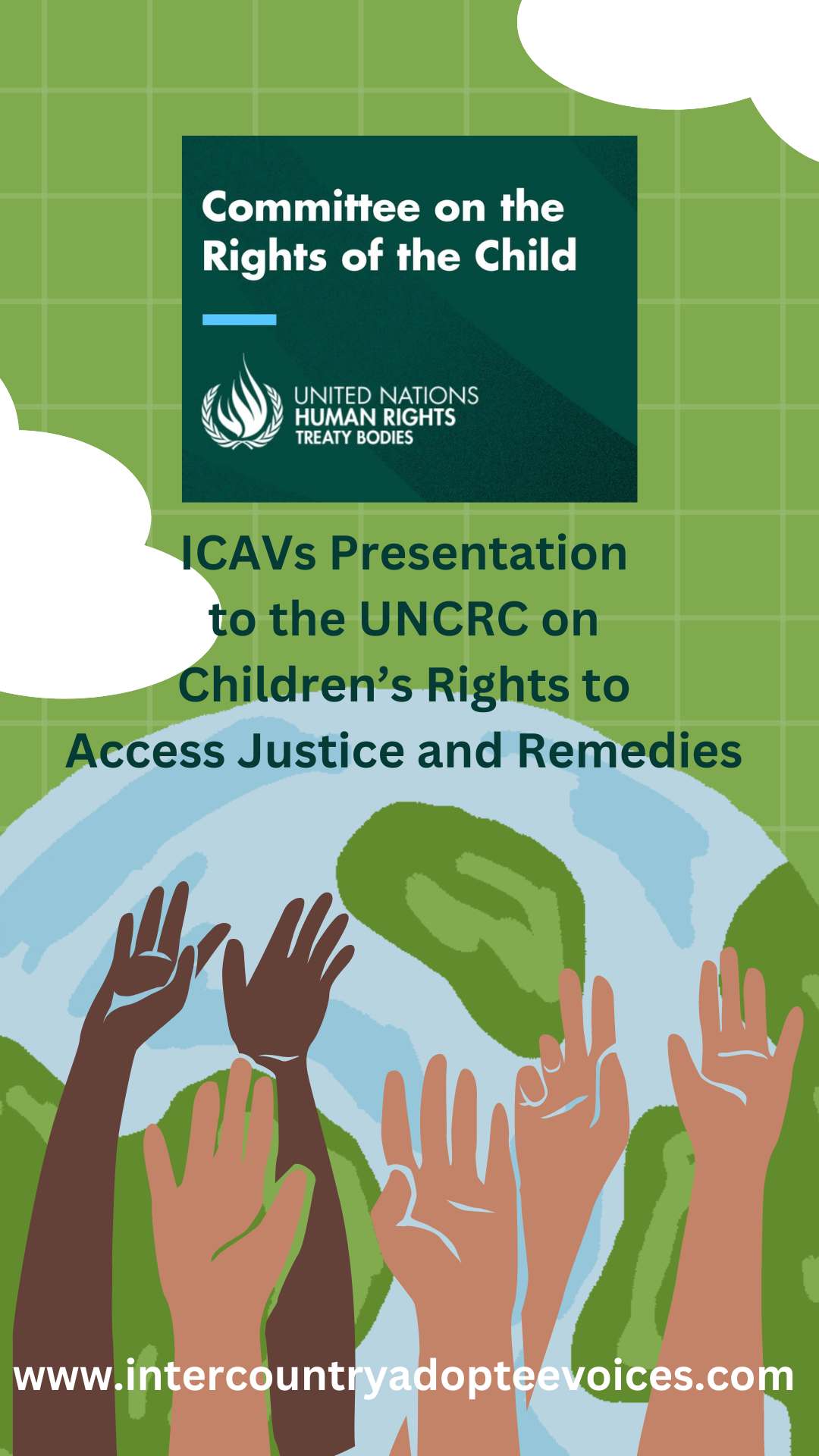Author: lynellelong
-

Children’s Rights to Access Justice and Effective Remedies
—
by
in Abuse in Adoption, Adoptee Activism, Adoptees Educate, Adoption Education for Professionals, adoption reform, Adoption Research, Citizenship in Adoption, Compensation to Victims in Adoption, Critical Thinking in Adoption, DNA Searching, Forced separation, Illegal Adoption, Impacts to Biological Families, Importance of Connections to Origins, Is adoption the best option, Lifelong Impacts of Adoption, Not Knowing in Adoption, Origins Search, Politics of Adoption, Reparation in Adoption, Return to Birth Country, Rights in Adoption, Search and Reunion in Adoption, Sense of Belonging, UN Joint Statement Illegal AdoptionICAV presents to UNCRC on 18May24 for purposes of drafting the General Comment on Access to Justice and Remedies as children with violated childhoods and identities.
-
To the Parents I don’t Know
Meredith shares her song to express the many complex feelings she has for her Chinese parents whom she doesn’t know and has lost since being adopted to the UK.
-
Romania from the lens of a returning adoptee
Céline Lăcrămioara, born in Romania and adopted to Belgium, returns as a professional photographer, capturing her birth country and people in these portfolios.
-
I don’t know
Xanne-Li shares her music written to express some of the heartache and pain of not knowing as an intercountry adoptee from China.
-
Monologue performances showcasing the complex lived experience of adoption from Colombia
—
by
in Adjustment and Transition, Adoptee Artists, Adoptee Artwork, Adoptee vulnerability, Adoptees Educate, Adoption Education for Professionals, Colombia, Complexities in Adoption, Critical Thinking in Adoption, Grief and Loss, Importance of Connections to Origins, Is adoption the best option, Lifelong Impacts of Adoption, Not Knowing in Adoption, Origins Search, Racial Mirrors, Sense of Belonging, The Netherlands, Transracial Adoption, Trauma in AdoptionPerformances by José Montoya: one on Grief the other a biographic portrayal of his life, adopted from Colombia to the Netherlands and the complexities within.
-
Adoptees as experts and influencing international standards through advocacy
—
by
in 1993 Hague Convention, Adoptee Activism, Adoptees Educate, Adoption Education for Professionals, adoption reform, Adoptive Country, Birth Country, Birth parents speak out, Complexities in Adoption, Critical Thinking in Adoption, Family Preservation, Illegal Adoption, Impacts to Biological Families, Is adoption the best option, Lifelong Impacts of Adoption, Politics of Adoption, Reparation in Adoption, Rights in Adoption, Transracial Adoption, Trauma in Adoption, UN Joint Statement Illegal AdoptionLynelle shares about the journey from understanding her adoption to becoming an adoptee advocate, pushing for much needed change at international levels.
-
Vietnamese mother searching for her daughter
Vietnamese mother searching for her daughter adopted to either Belgium or France
-
Reflecting on 25 Years as Founder of ICAV
Celebrating and reflecting on 25 years since ICAV began, the changes, the achievements and highlighting the power of peer support and collaboration over time.
-
My day of reckoning with the Lutheran Church
Lynelle shares her healing journey thru a Direct Personal Response (DPR) with the Lutheran Church who gave a face to face apology for their role in her abuse.
-
Reunion and Beyond
ICAVs upcoming webinar on Reunion and Beyond in Intercountry Adoption is available to RSVP. Book your tickets now.
-
AntiRacism Online Workshops for Transracial Adoptive Parents
ICAV and HUE provide an online workshop for adoptees and families to explore race, racism, how to be an antiracism ally as some of our core issues in adoption.
-
Searching in Intercountry Adoption by Adoptee Experts
ICAV presents a webinar on Searching on 23 April 2023 from lived experience and those who provide a formal search and support service.
-
Agent Orange Awareness Month
—
by
in Adoptees Educate, Adoption and Disability, Complexities in Adoption, Critical Thinking in Adoption, Family Preservation, Gratitude in Adoption, Grief and Loss, Impacts to Biological Families, Is adoption the best option, Lifelong Impacts of Adoption, Origins Search, Special Medical Conditions, Transracial Adoption, Trauma in Adoption, VietnamLynelle shares thoughts of October as Agent Orange Awareness Month which triggers a deeper look into how she came to be sent abroad as a Vietnamese adoptee.